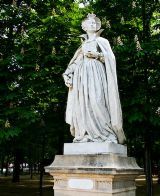| Presidents and Dictators |
Grass and Flowers
Remembering
World War II,
its Legacy,
and connecting some dots. . .
Lindsay House Publishing
|
|
W hen Joshua, Caleb and ten other men returned
to their people to report on their spying trip, the Children of
God was angry and wanted to destroy them all. So Moses
pleaded with God. (Numbers
14:17-19)
'The LORD is slow to anger and abundant in lovingkindness,
forgiving iniquity and transgression; but He will by no means clear the guilty,
visiting the iniquity of the fathers on the children to the third and the
fourth generations.'
"Pardon, I pray, the iniquity of this people according to the
greatness of Your lovingkindness, just as You also have forgiven this people,
from
The lady sat on the porch, her gaze moving from one potted plant to
another, then back again. The nandina shrub in the big pot in front of her
chair, had required complete cutting-back to bare stalks before it burst forth
in the springtime with new growth. Now it was full and lovely!
The Japanese maple had needed a good pruning too. She smiled. remembering her nervousness as she removed each piece of dead wood from the delicate little tree. Both the Japanese maple and the nandina were just hers on loan.
Japanese maple with new leaves
He was tall
and slender, with an air of purpose about him.
As she had come to know this
man, he proved to have an agenda of his own.
He spoke out of both sides of his mouth, and what came out depended on who ever was listening.
He was the president of a small company which produced information
security
items. The founding partners were Christian in orientation.
Some were true,
others were professing and nominal.
The lady had a small amount of money to
invest, and had decided
to become part of this company because of the integrity
of one
of the partners. The company was called BEMA, an acronym for
Bulwark Electromagnetic Applications.
To the true Christian partners, BEMA was the Greek word
for the Judgment Seat of Christ. This gave them comfort and hope.
With time however, BEMA came to mean to the lady and her partners,
Betrayed by an Enemy Masquarading as an Ally.
The company was now bankrupt, since the president and
corporate counsel had stolen all the assets.
The lady's thoughts turned
again. She recalled some historical
reading, and some family experiences. The "why factor" in any question still
provoked her. The more she thought about the major personalities of history;
their lives and circumstances, the more she was convinced that every event had
a cause.
Cause and effect - (applying to the physical world), Sir Isaac Newton
defined it as the third Law of Motion: Every action has an equal and opposite
reaction. Truth be told,
She mused: if this is true on a personal level, where our choices and our
words bring us either blessings or curses, it must then be true on the stage of
national and international events as well.
Since individuals who are highly placed politically make decisions, and
commitments for those they represent.
A yellow flag went up inside of her as she considered THIS one!
Suppose an emperor, king or president was confident of his position,
allowing his selfish nature with its pride and greed to make decisions for his
nation and its people. Or suppose that women, wives (queens), mistresses,
mothers or daughters, influenced the ruler through manipulating his emotions.
"But this is the stuff that historical drama is made of." She said to
herself. Names came to mind: Rome's Emperor Nero, Alexander (the Great) of
Greece, King Herod of Judea, the
Mongols' Genghis Khan, Richard III of England,
Louis XIV and Napoleon Bonaparte (both of France).
Catherine de Medici from Florence and niece of a pope, disciple of
Machiavelli's teaching, became Queen of France. Then she was Regent for her
underage sons when they were kings. Working later with Cardinal Richelieu, she
planned the persecution and annihilation of
Catherine de Medici, Queen of France Statue, Luxembourg Gardens, Paris
Lord Acton, a British historian and trusted adviser to Queen Victoria's
Prime Minister, Disraeli, wrote:
"Power tends to corrupt, and absolute power
corrupts absolutely."
All
flesh is like grass, and all its glory like the flower of grass.
The
grass withers and the flower falls off,
But
the word of the Lord endures forever.
1st Peter 1:24, 25
And so, thought the lady, the lessons of
history are plain to see, but are we looking? They warn us of allowing corrupt
people to hold power over our lives - but are we listening?
Power corrupts. Absolute power corrupts absolutely. Lord Acton, you nailed it!
The democratic process can be dangerous, as a candidate's image is designed
and developed to harvest the most votes possible. Psychological and public
relations consultants have major parts to play in any political campaign just
as they do in the advertising and marketing of goods.
Only the results matter to many political operatives, not the honesty and
integrity of the candidate and their campaign. The buyer must beware, and
closely examine all the personal and public motives of a candidate. The winner
of an election takes into his or her public office the financial backers and
workers who worked for them during the campaign. They already have an agenda,
and begin to carry it out as soon as they have legal authority.
Do we remember that Bill Clinton
fired every one
of the federal judges in the nation,
the very first day he took
office?
She
began to consider her father's military career. It had spanned the economic
depression of the 1930s, World War II, the creation of the
His work was an integral part of the
creation of NATO. He served under General Douglas MacArthur in the Pacific,
helping defeat the Japanese, then helped begin the American occupation of
There in Yalta (Ukraine), Malta (an island
south of Italy), and Tehran (Iran), Roosevelt, Churchill and Stalin had met
together, along with their high military staffs. They sought to reach agreement
and plan strategy for defeat of the Nazi, Italian and Japanese military. As a
member of General Eisenhower's planning staff, the lady's father was in
attendance at all three conferences. At these meetings, the most dreadful and
dangerous examples of Lord Acton's observation, that power corrupts and
absolute power corrupts absolutely, were realized.
As
these thoughts passed through her mind,
the
lady realized she was in a process
that
could change her life forever-
and probably, the lives of many others.
By contrast,
As a result, and as told by Churchill in his memoirs,
Although Churchill did
not agree, Stalin walked away with all of Eastern Europe and half of
The lady shuddered.
One might object that unlike Andrew Jackson, FDR is unforgettable; that
he will forever be paired with the finest statesmen; above all, with Churchill
and deGaulle, who made him a central figure in their war memoirs. Since these
are indelible classics in the literature of great statesmanship, one might
suppose that
[Conrad] Black responds to this objection indirectly but with
extraordinary care. He clearly gives pride of place to these most influential
and widely read memoirs. He sees Churchill and deGaulle as the most
intelligent and capable statesmen who wrote from first-hand experience of
For in their respective memoirs, Churchill and deGaulle are sharply critical
of FDR's wartime policies. Although in The Second World War he
celebrated his warm friendship with Roosevelt, Churchill still managed to
convey his reasoned condemnation of U.S. diplomacy from the Tehran Conference
on: FDR's failure to present a united Allied front to Stalin and thus his
surrender of the moral high ground; his willingness to side with Stalin on the
elimination of Germany as a European state; his slowness to confront Communist
subversion in Greece and Eastern Europe; and above all his failure to prepare
Harry Truman to take over the presidency.
DeGaulle's criticisms in his war memoirs took a different but equally
damning tack.
Among other things, he objected to Roosevelt's diplomatic
dalliances with Vichy France; to his cunning policy of setting deGaulle and
Churchill at loggerheads, the better to reorganize Europe as FDR saw fit; and
to Roosevelt's overweening desire to dismantle the French and British colonial
empires and erect some sort of international New Deal in their place.
The
following is from Wikipedia:
United States of America
Roosevelt, only 62 in 1944, was in declining
health since at least 1940. The strain of his paralysis and the physical
exertion needed to compensate for it for over 20 years had taken their toll, as
had many years of stress and a lifetime of chain-smoking. He had high blood pressure and long-term heart disease.
Aware of the risk that Roosevelt would die
during his fourth term, the party regulars insisted that Henry Wallace, who was
seen as too pro-Soviet, be dropped as Vice President. After considering James F. Byrnes of South Carolina, and being turned down by Indiana goverernor, Henry F. Schricker, Roosevelt replaced
Wallace with the little known Senator Harry S. Truman. In the 1944 election,
Roosevelt and Truman won 53% of the vote and carried 36 states, against New
York Governor Thomas E. Dewey.
Last days, death and
memorial
The President left the Yalta Conference on February 12, 1945, and
flew to Egypt and boarded the USS Quincy, operating on the Great Bitter Lake near the Suez Canal.
Aboard Quincy, the next day he met with Farouk I,
king of Egypt,
and Haile Selassie, emperor of Ethiopia.
On February 14, he held an historic meeting with King Abdul Aziz, the founder of Saudi Arabia, a meeting which holds profound significance in U.S.-Saudi
relations even today. After a final meeting between Roosevelt and Prime
Minister Winston Churchill, Quincy
steamed for Algiers, arriving February 18, at which time Roosevelt
conferred with American ambassadors to Great Britain, France and Italy.
When he returned to the United States, he
addressed Congress on March 1 about the
During March and early April 1945, he sent
strongly worded messages to Stalin accusing him of breaking his
On March 30, 1945,
Roosevelt went to Warm Springs [Georgia] to rest
before his anticipated appearance at the founding conference of the United
Nations. On the afternoon of April 12, Roosevelt said, "I have a
terrific headache" and was carried into his bedroom. The doctor diagnosed
that he had suffered a massive cerebral hemorrhage, and as Allen Drury once said "so ended an era, and so began another."
He died while sitting for a portrait painting
by the artist Elizabeth Shoumatoff, resulting in
the famous Unfinished Portrait of FDR. Lucy Mercer, his former mistress, was with
him at the time of his death, and Shoumatoff, who maintained close friendships
with both Roosevelt and Mercer, rushed her away to avoid negative publicity and
implications of infidelity.
In his latter years at the White House,
Roosevelt was increasingly overworked and his daughter Anna Roosevelt Boettiger, had moved in to provide her father companionship
and support. Anna had also arranged for her father to meet with the now widowed
Lucy Mercer Rutherfurd. When Eleanor heard about her husband's death, she was
also faced with the news that Anna had been arranging these meetings with Lucy
and that Lucy had been with
Roosevelt's death was met with shock and grief
across the
Roosevelt was interred in the town of his
birth at the Franklin D. Roosevelt Historical Site, at Hyde Park, in Duchess County, New York.
Less than a month after his
death, on May 8, 1945, came the moment Roosevelt fought for: V-E Day. President Harry Truman dedicated V-E Day and its celebrations to Roosevelt's memory,
paying tribute to his commitment to ending the war in Europe.
The lady spoke softly to herself:
Such is the action of dominos, each causing the fall of the next. Such is
the action of Cause and Effect. If wisdom and reality had prevailed, the
politicians would not have pushed for
The lady stopped short of sliding into discouragement from her musings.
Her studies of Scripture and the experiences of strong intercessors gave her
much hope. So she prayed, confessing the sins of her father and all his
associates, including Roosevelt, the deceased president of the
"Will this kind of prayer really help change things today and for the
future?" she asked herself. "Yes, I am
sure it will!" In the 9th chapter of his book, the prophet Daniel
prayed this way concerning the people, kings and judges of
"Oh Lord" she prayed, "forgive us and show us the truth, and how to
cancel the curses that have come because of these things!"
She sighed, then smiled, for she knew that when enough believing,
faithful people prayed like this, the prayer would be answered, because our
Heavenly Father is a God of mercy.
Prayer of Release


